六年级 小学英语 一般将来时
- 格式:ppt
- 大小:360.00 KB
- 文档页数:30
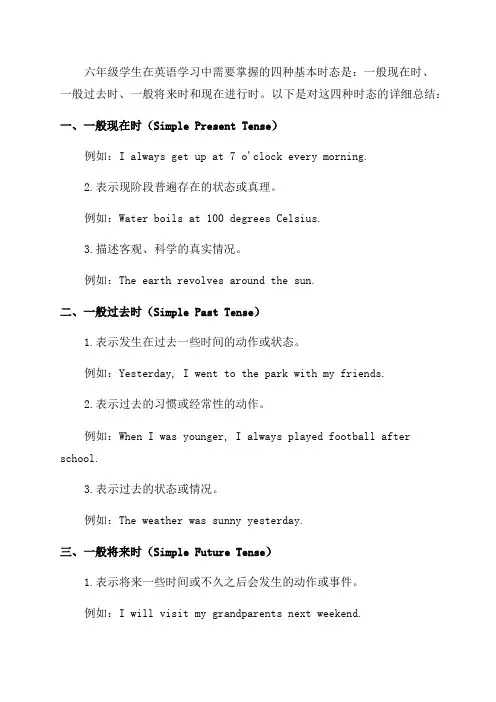
六年级学生在英语学习中需要掌握的四种基本时态是:一般现在时、一般过去时、一般将来时和现在进行时。
以下是对这四种时态的详细总结:一、一般现在时(Simple Present Tense)例如:I always get up at 7 o'clock every morning.2.表示现阶段普遍存在的状态或真理。
例如:Water boils at 100 degrees Celsius.3.描述客观、科学的真实情况。
例如:The earth revolves around the sun.二、一般过去时(Simple Past Tense)1.表示发生在过去一些时间的动作或状态。
例如:Yesterday, I went to the park with my friends.2.表示过去的习惯或经常性的动作。
例如:When I was younger, I always played football after school.3.表示过去的状态或情况。
例如:The weather was sunny yesterday.三、一般将来时(Simple Future Tense)1.表示将来一些时间或不久之后会发生的动作或事件。
例如:I will visit my grandparents next weekend.2.表示打算、计划或意图。
例如:I am going to study hard for the exam.3.表示预测、预言或非即刻发生的事情。
例如:It will rain tomorrow.四、现在进行时(Present Continuous Tense)1.表示现在正在进行的动作或状态。
例如:I am studying English now.2.表示临时的、目前的事情。
例如:She is staying at her friend's house this week.3.表示将来已确定的计划或安排。
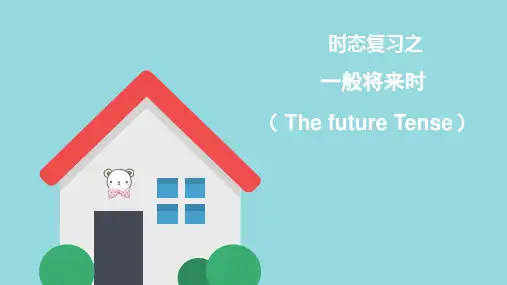
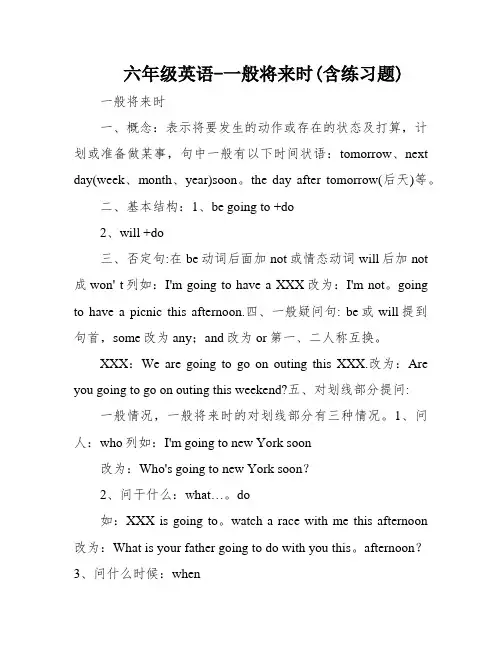
六年级英语-一般将来时(含练习题)一般将来时一、概念:表示将要发生的动作或存在的状态及打算,计划或准备做某事,句中一般有以下时间状语:tomorrow、next day(week、month、year)soon。
the day after tomorrow(后天)等。
二、基本结构:1、be going to +do2、will +do三、否定句:在be动词后面加not或情态动词will后加not 成won' t列如:I'm going to have a XXX改为:I'm not。
going to have a picnic this afternoon.四、一般疑问句: be或will提到句首,some改为any;and改为or第一、二人称互换。
XXX:We are going to go on outing this XXX.改为:Are you going to go on outing this weekend?五、对划线部分提问: 一般情况,一般将来时的对划线部分有三种情况。
1、问人:who列如:I'm going to new York soon改为:Who's going to new York soon?2、问干什么:what…。
do如:XXX is going to。
watch a race with me this afternoon 改为:What is your father going to do with you this。
afternoon?3、问什么时候:when列如:She's going to go to bed at nine 改为:When is going to bed?六、同义句:。
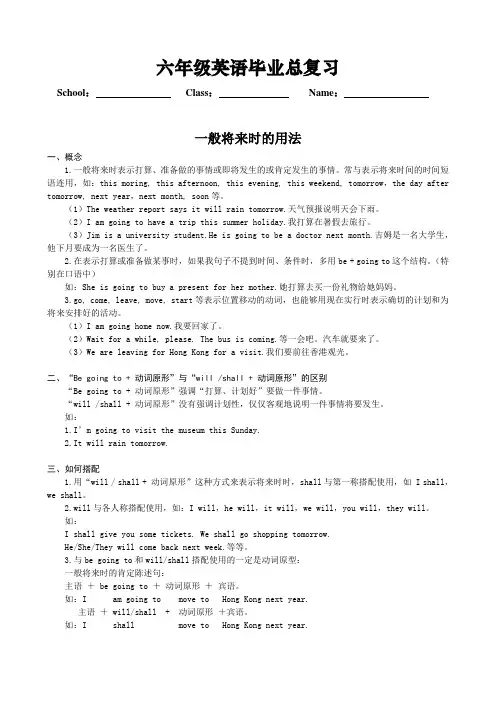
六年级英语毕业总复习School:Class:Name:一般将来时的用法一、概念1.一般将来时表示打算、准备做的事情或即将发生的或肯定发生的事情。
常与表示将来时间的时间短语连用,如:this moring, this afternoon, this evening, this weekend, tomorrow,the day after tomorrow, next year,next month, soon等。
(1)The weather report says it will rain tomorrow.天气预报说明天会下雨。
(2)I am going to have a trip this summer holiday.我打算在暑假去旅行。
(3)Jim is a university student.He is going to be a doctor next month.吉姆是一名大学生,他下月要成为一名医生了。
2.在表示打算或准备做某事时,如果我句子不提到时间、条件时,多用be + going to这个结构。
(特别在口语中)如:She is going to buy a present for her mother.她打算去买一份礼物给她妈妈。
3.go, come, leave, move, start等表示位置移动的动词,也能够用现在实行时表示确切的计划和为将来安排好的活动。
(1)I am going home now.我要回家了。
(2)Wait for a while, please. The bus is coming.等一会吧。
汽车就要来了。
(3)We are leaving for Hong Kong for a visit.我们要前往香港观光。
二、“Be going to + 动词原形”与“will /shall + 动词原形”的区别“Be going to + 动词原形”强调“打算、计划好”要做一件事情。
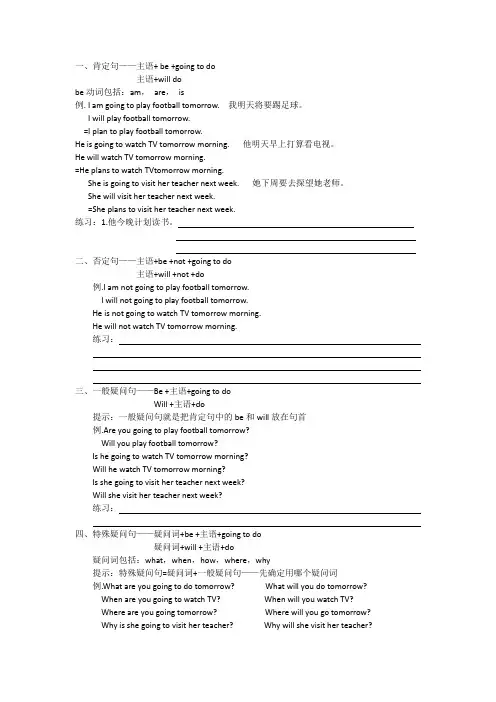
一、肯定句——主语+ be +going to do主语+will dobe动词包括:am,are,is例. I am going to play football tomorrow. 我明天将要踢足球。
I will play football tomorrow.=I plan to play football tomorrow.He is going to watch TV tomorrow morning. 他明天早上打算看电视。
He will watch TV tomorrow morning.=He plans to watch TVtomorrow morning.She is going to visit her teacher next week. 她下周要去探望她老师。
She will visit her teacher next week.=She plans to visit her teacher next week.练习:1.他今晚计划读书。
二、否定句——主语+be +not +going to do主语+will +not +do例.I am not going to play football tomorrow.I will not going to play football tomorrow.He is not going to watch TV tomorrow morning.He will not watch TV tomorrow morning.练习:三、一般疑问句——Be +主语+going to doWill +主语+do提示:一般疑问句就是把肯定句中的be和will放在句首例.Are you going to play football tomorrow?Will you play football tomorrow?Is he going to watch TV tomorrow morning?Will he watch TV tomorrow morning?Is she going to visit her teacher next week?Will she visit her teacher next week?练习:四、特殊疑问句——疑问词+be +主语+going to do疑问词+will +主语+do疑问词包括:what,when,how,where,why提示:特殊疑问句=疑问词+一般疑问句——先确定用哪个疑问词例.What are you going to do tomorrow? What will you do tomorrow?When are you going to watch TV? When will you watch TV?Where are you going tomorrow? Where will you go tomorrow?Why is she going to visit her teacher? Why will she visit her teacher?。
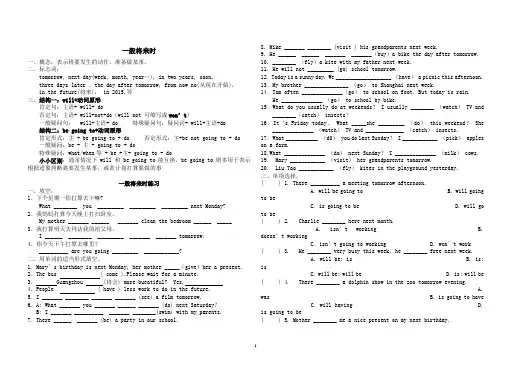
一般将来时一、概念:表示将要发生的动作,准备做某事。
二、标志词:tomorrow, next day(week, month, year…), in two years, soon,three days later ,the day after tomorrow, from now no(从现在开始),in the future(将来), in 2015,等三、结构一:will+动词原形肯定句:主语+ will+ do否定句:主语+ will+not+do(will not 可缩写成won’t)一般疑问句: will+主语+ do 特殊疑问句:疑问词+ will+主语+do结构二:be going to+动词原形肯定形式:主 + be going to + do 否定形式:主+be not going to + do 一般疑问:be + 主 + going to + do特殊疑问:what/when等 + be +主+ going to + do小小区别:通常情况下will 和 be going to能互换,be going to则多用于表示根据迹象判断将要发生某事,或者计划打算要做的事一般将来时练习一、填空:1、下个星期一你打算去干嘛?What ________ you _________ _________ _________ next Monday?2、我妈妈打算今天晚上打扫卧室。
My mother _______ ______ _______ clean the bedroom ______ _____3、我打算明天去拜访我的祖父母。
I ______ ________ _________ _______ _______ tomorrow.4、你今天下午打算去哪里?__________ are you going _________ ____________?二、用单词的适当形式填空。
1. Mary’s birthday is next Monday, her mother _____(give)her a present.2、The bus ( come ).Please wait for a minute.3、 Guangzhou (将会) more bueatiful? Yes,4、People ( have ) less work to do in the future.5. I _______ ________ _______ _______ (see) a film tomorrow.6. A: What _______ you _______ ______ _______ (do) next Saturday?B: I _______ __________ _______ ________(swim) with my parents.7. There ______ _______ (be) a party in our school. 8. Mike _______ ________ (visit ) his grandparents next week.9. He ______ ______ _______ _______(buy)a bike the day after tomorrow.10. ________ (fly)a kite with my father next week.11. He will not _________ (go) school tomorrow.12.Today is a sunny day. We ___________________ (have) a picnic this afternoon. 13.My brother _______________ (go) to Shanghai next week.14.Tom often ______________(go) to school on foot. But today is rain.He ______________ (go) to school by bike.15.What do you usually do at weekends? I usually ________ (watch) TV and ________(catch) insects?16.It‘s Friday today。
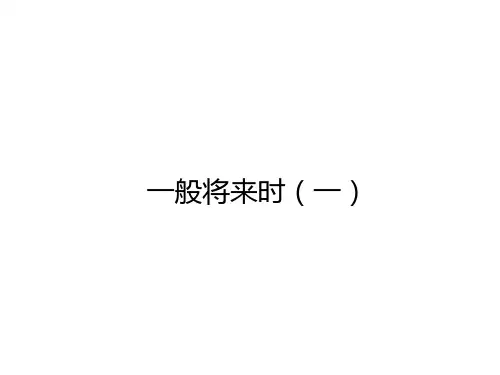
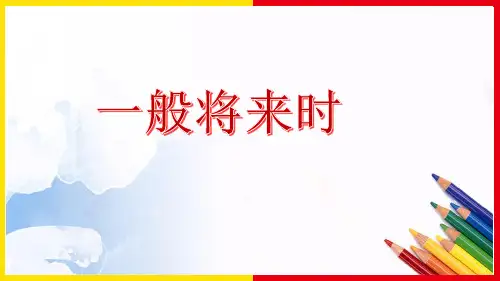
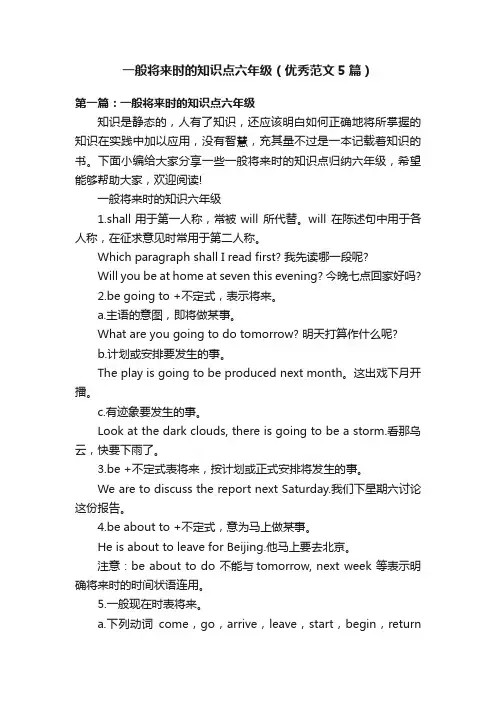
一般将来时的知识点六年级(优秀范文5篇)第一篇:一般将来时的知识点六年级知识是静态的,人有了知识,还应该明白如何正确地将所掌握的知识在实践中加以应用,没有智慧,充其量不过是一本记载着知识的书。
下面小编给大家分享一些一般将来时的知识点归纳六年级,希望能够帮助大家,欢迎阅读!一般将来时的知识六年级1.shall用于第一人称,常被will 所代替。
will 在陈述句中用于各人称,在征求意见时常用于第二人称。
Which paragraph shall I read first? 我先读哪一段呢?Will you be at home at seven this evening? 今晚七点回家好吗?2.be going to +不定式,表示将来。
a.主语的意图,即将做某事。
What are you going to do tomorrow? 明天打算作什么呢?b.计划或安排要发生的事。
The play is going to be produced next month。
这出戏下月开播。
c.有迹象要发生的事。
Look at the dark clouds, there is going to be a storm.看那乌云,快要下雨了。
3.be +不定式表将来,按计划或正式安排将发生的事。
We are to discuss the report next Saturday.我们下星期六讨论这份报告。
4.be about to +不定式,意为马上做某事。
He is about to leave for Beijing.他马上要去北京。
注意:be about to do 不能与tomorrow, next week 等表示明确将来时的时间状语连用。
5.一般现在时表将来。
a.下列动词come,go,arrive,leave,start,begin,return的一般现在时可以表示将来,主要用来表示在时间上已确定或安排好的事情。
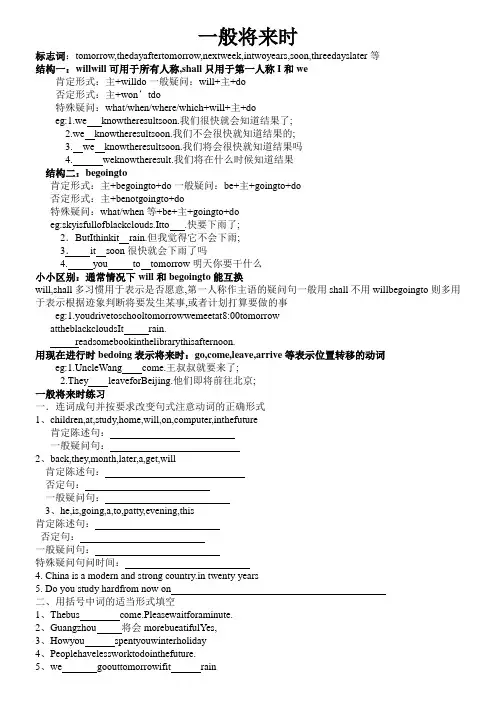
一般将来时标志词:tomorrow,thedayaftertomorrow,nextweek,intwoyears,soon,threedayslater等结构一:willwill可用于所有人称,shall只用于第一人称I和we肯定形式:主+willdo一般疑问:will+主+do否定形式:主+won’tdo特殊疑问:what/when/where/which+will+主+doeg:1.we knowtheresultsoon.我们很快就会知道结果了;2.we knowtheresultsoon.我们不会很快就知道结果的;3. we knowtheresultsoon.我们将会很快就知道结果吗4. weknowtheresult.我们将在什么时候知道结果结构二:begoingto肯定形式:主+begoingto+do一般疑问:be+主+goingto+do否定形式:主+benotgoingto+do特殊疑问:what/when等+be+主+goingto+doeg:skyisfullofblackclouds.Itto .快要下雨了;2.ButIthinkit rain.但我觉得它不会下雨;3.it soon很快就会下雨了吗4. you to tomorrow明天你要干什么小小区别:通常情况下will和begoingto能互换will,shall多习惯用于表示是否愿意,第一人称作主语的疑问句一般用shall不用willbegoingto则多用于表示根据迹象判断将要发生某事,或者计划打算要做的事eg:1.youdrivetoschooltomorrowwemeetat8:00tomorrowattheblackcloudsIt rain.readsomebookinthelibrarythisafternoon.用现在进行时bedoing表示将来时:go,come,leave,arrive等表示位置转移的动词eg:1.UncleWang come.王叔叔就要来了;2.They leaveforBeijing.他们即将前往北京;一般将来时练习一.连词成句并按要求改变句式注意动词的正确形式1、children,at,study,home,will,on,computer,inthefuture肯定陈述句:一般疑问句:2、back,they,month,later,a,get,will肯定陈述句:否定句:一般疑问句:3、he,is,going,a,to,patty,evening,this肯定陈述句:否定句:一般疑问句:特殊疑问句问时间:4. China is a modern and strong country.in twenty years5. Do you study hardfrom now on二、用括号中词的适当形式填空1、Thebus come.Pleasewaitforaminute.2、Guangzhou 将会morebueatifulYes,3、Howyou spentyouwinterholiday4、Peoplehavelessworktodointhefuture.5、we goouttomorrowifit rain三、选择正确的答案1. Thereanimportantmeetingnextweek.A.willbeB.willhaveC.willhasD.willgoingtobe2. toEnglandtomorrow.A.flyB.flewC.isflyingD.flies3. Marywillcomebackfiveo’ter4. yougototheparktomorrowA.WillB.ShallC.DoD.Are5. . The day after tomorrow they ________ a volleyball match.A. will watchingB. watchesC. is watchingD. is going to watch6. .There ________ a birthday party this Sunday.A. shall beB. will beC. shall going to beD. will going to be7. They ________ an English evening next Sunday.A. are havingB. are going to haveC. will havingD. is going to have8. ________ you ________ free next Sunday A. Will; areB. Will; be C. Do; be D. Are; be9. He ________ there at ten tomorrow morning. A. willB. Is C. will beD. be10. ________ your brother ________ a magazine from the libraryA. Are; going to borrowB. Is; going to borrowC. Will; borrowsD. Are; going to borrows作业:一、单项选择;1. There __________ a meeting tomorrow afternoon.A. will be going toB. will going to beC. is going to beD. will go to be2. Charlie ________ here next month.A. isn’t workingB. doesn’t workingC. isn’t going to workingD. won’t work3. He ________ very busy this week, he ________ free next week.A. will be; isB. is; isC. will be; will beD. is; will be4. There ________ a dolphin show in the zoo tomorrow evening.A. wasB. is going to haveC. will haveD. is going to be5.–________ you ________ free tomorrow – No. I ________ free the day after tomorrow.A. Are; going to; willB. Are; going to be; willC. Are; going to; will beD. Are; going to be; will be6. Mother ________ me a nice present on my next birthday.A. will givesB. will giveC. givesD. give7. – Shall I buy a cup of tea for you–________. 不,不要;A. No, you won’t.B. No, you aren’. No, please don’t.D. No, please.8. – Where is the morning paper – I ________ if for you at once.A. getB. am gettingC. to getD. will get二、动词填空;1. I ______leavein a minute. I ______finishall my work before I ______ leave.2. —How long _____ you _____studyin our country—I _____planto be here for about one more year.—What ______ you ______doafter you ______leavehere—I ______returnhome and ______geta job.3. I ______betired. I ______goto bed early tonight.4. Mary’s birthday is next Monday, her mother _____giveher a present.三、句型转换;1. People in the north often go skating in winter. next winter2. There are two cinemas in that town. next year3. He comes back late.in two days4.She is a conductor of a train.soon。
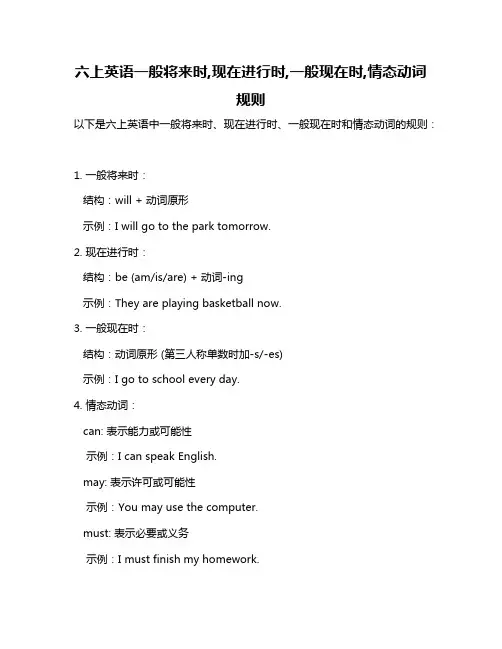
六上英语一般将来时,现在进行时,一般现在时,情态动词
规则
以下是六上英语中一般将来时、现在进行时、一般现在时和情态动词的规则:
1. 一般将来时:
结构:will + 动词原形
示例:I will go to the park tomorrow.
2. 现在进行时:
结构:be (am/is/are) + 动词-ing
示例:They are playing basketball now.
3. 一般现在时:
结构:动词原形 (第三人称单数时加-s/-es)
示例:I go to school every day.
4. 情态动词:
can: 表示能力或可能性
示例:I can speak English.
may: 表示许可或可能性
示例:You may use the computer.
must: 表示必要或义务
示例:I must finish my homework.
shall: 表示建议或命令
示例:You shall stay out of the garden.
will: 表示意愿或将来时间
示例:I will help you.
这些规则是英语语法中的基础部分,需要不断练习和巩固。
如需更多信息,建议查阅语法书籍或咨询英语教师。
六年级英语作文一般将来时10句话全文共6篇示例,供读者参考篇1My Dreams for the FutureI will be a famous scientist when I grow up! I have always loved learning about how things work and making new discoveries. In the future, I will travel to many different countries to study rare plants and animals. I will work hard in school and get good grades so I can go to the best university. After university, I will get a job at a big research laboratory. There, I will conduct experiments and try to find cures for diseases. I will write books about my scientific findings so everyone can learn from me. I will also go on adventures to unexplored parts of the world in search of new species. I will bring back samples and specimens to study. Someday, I will even travel to outer space as part of a team of astronauts! We will explore other planets and search for signs of life. I will never stop learning and being curious about the world around me.When I'm not working as a scientist, I will spend time with my family. I will get married and have two kids - a boy and a girl.We will live in a big house with a yard for the kids to play in. On weekends, we will go on fun trips to the beach, parks, and museums. I will teach my kids all about science and the importance of protecting the environment. We will recycle, use renewable energy, and drive an electric car to reduce pollution. I will enroll them in after-school STEM programs so they can learn to code and do experiments from a young age. My children will grow up seeing how rewarding a career in science can be.Maybe one day they will become scientists too and join me on expeditions! We will be like a family of real-life explorers, making groundbreaking discoveries together. We will travel the world, ford raging rivers, climb misty mountains, and document new species of plants and animals. I will feel so proud watching my children present their findings to admiring audiences. Our family's work will expand human knowledge and help make the world a better place.Even when I'm old and retired, I will never lose my love of science. I will volunteer at local schools, visiting classrooms to inspire young students with demonstrations and stories from my globe-trotting adventures. I will donate money to fund scholarships for underprivileged kids who dream of becoming scientists too. In my free time, I will take up hobbies likestargazing, gardening, and amateur paleontology. Maybe I will even make one last monumental discovery! I will live every day to the fullest, having the career of my dreams and passing on my passion to future generations. Science will always be a huge part of my life's journey.篇2The Exciting World of TomorrowWhat will the world be like in the future? As a kid, I can't help but dream about all the amazing possibilities! I've spent many nights staring at the ceiling, imagining flying cars zipping through the skies and robots doing all my chores. The future seems so full of wonder and endless opportunities.One thing I'm really looking forward to is the advancement of technology. I can't wait until every home has a personal robot assistant to help with cleaning, cooking, and any other task we need a hand with. No more arguing with my little brother over who has to take out the trash! The robot will handle that for us. I also dream of the day when we can simply speak or think about what we want, and instantly have it show up through some miraculous teleportation device. No more waiting for packagesto arrive – they'll just pop into existence right in front of us! How incredibly convenient that would be.I'm also really excited about future developments in transportation. Don't get me wrong, I love my bike and all, but can you imagine soaring over traffic in your own personal flying vehicle? Or being able to teleport from place to place in the blink of an eye? No more long car rides listening to my parents argue over directions. We'll just set the coordinates and boom – we're there! And forget about planes – we'll be able to usehyper-speed space transit to visit other planets and explore distant galaxies. Meeting alien civilizations could be in our future!I also wonder what the homes and cities of the future will look like. Will we all live in huge towering mega-cities, stacked mile-high with homes and offices? Or will technology allow us to spread out more, with homes in remote areas but still connected to work, school, and entertainment virtually? Living in harmony with nature, but also interfaced with all the modern conveniences – that sounds like the dream to me. No more ugly strip malls and smoggy downtowns, but instead gorgeous green cities with self-sustaining renewable everything.Those are just a few of the things I dream about for the future world I'll someday grow up into. Of course, I know it's impossible to predict everything that will happen and what mind-boggling new inventions await. But I have faith that the engineers, scientists, and creative minds of tomorrow will confront any challenges and keep pushing the boundaries of what's possible. The future may be unknowable, but I'm definitely looking forward to being a part of it. To the kids of today – the future builders of tomorrow – the sky is nowhere near the limit. An infinite universe of possibilities awaits us!篇3My Life in Ten YearsI can hardly imagine what my life will be like ten years from now when I'm in my early 20s! So much will have changed by then. Right now, I'm just a kid in the 6th grade, but in a decade, I'll be a full-grown adult. Crazy, right?When I'm in my 20s, I will have already graduated from high school and college. I'm not totally sure what I want to study yet, but I'm thinking maybe something with computers or technology. That's a field that really interests me and it seems like it will be a big part of the future world. Maybe I'll even get towork on developing artificial intelligence or design video games for a living! How cool would that be?No matter what career I end up choosing, I know I'll be working really hard at it. I won't just sit around and play video games all day like I do now (well, maybe a little!). I'll have responsibilities and bills to pay. I'll probably have an apartment or small house somewhere too. I'm really looking forward to being independent and living on my own, even though I know it will be tough at times.Wherever I end up living, I hope it's in a big, exciting city. I love the energy and lights of the city. There's always something fun or interesting happening, whether it's concerts, sporting events, museums, you name it. The city is where all the action happens! Small towns are just too quiet and boring for me. Although, I may have to live outside the city for a while to save up money before moving to a huge metropolis.Speaking of money, I really hope I'll be making enough to support myself comfortably. I don't need to be super rich or have a ridiculousAmount of money. But it would be nice to not have to worry about paying bills or buying groceries. Enough to go out to restaurants and movies sometimes would be awesome. I'll definitely need a decent job to make that happen.In ten years, a lot of my closest friends now will have moved away to different cities and states probably. That will be really sad and I'll miss them a ton. But I'm sure I'll make new friends wherever I end up, whether it's co-workers, neighbors, or people with similar interests and hobbies. I'll still keep in touch with my old elementary and middle school friends too through texting, video chatting, and social media. The internet makes it easy to stay connected these days.I wonder if I'll have started a family by then too? That seems really far off from where I am now. But a lot of people do get married and have kids in their early-to-mid 20s. I'm honestly not sure if that will be my path or not. A part of me would love to have my own children someday to love and take care of. But another part isn't sure if I'd be ready or willing to give up my independence and freedom so young. I guess only time will tell on that one!No matter what though, I'm sure I'll be a lot more mature and grown up in ten years. I'll look older, dress older, and act older. I'll basically be a proper adult! It will be really bizarre to look back at the silly kid I am now and remember how naive and childish I used to be. Hopefully, I'll be wiser, more responsible, and have a better idea of what I want out of life. While being acarefree kid is fun, there's a whole big world out there I can't wait to experience.These are just my best guesses about what the future holds for me though. Nobody really knows what will happen or where we'll all end up. Maybe I'll take a completely different path than I'm expecting! That's part of the beauty and mystery of the future. For now, all I can do is continue working hard, following my dreams and passions, and making the most of each day. I'm sure by the time I'm in my 20s, my life is going to look incredibly different than it does today. I can't wait to see what surprises and adventures are in store! I'll just have to be patient and enjoy the journey.篇4The Future Holds So Much PotentialHave you ever imagined what the future will be like? I often daydream about all the incredible possibilities that lie ahead. The way I see it, the future is a blank canvas waiting to be painted with amazing scientific discoveries, technological advancements, and new frontiers to explore.One thing I'm really excited about is all the new inventions we'll have in the coming years. I bet there will be flying carszipping across the sky, taking us anywhere we want to go in a fraction of the time. Can you picture robots doing our chores and helping out around the house? No more cleaning my room or taking out the trash! I've also heard that someday, maybe even before I'm an adult, people will be able to take vacations in space hotels orbiting the Earth. Now that would be the ultimate adventure!Speaking of exploring, I can't wait to see what other planets humanity will voyage to in the decades ahead. Surely we'll have established colonies on Mars, mining its resources and studying its unique geology. But maybe explorers will also journey to moons of Saturn or Jupiter, setting up research stations to uncover their mysteries. And who's to say we won't eventually develop warp drives or hyper-fast engines that will let us visit other star systems light years away? Meeting alien species is something straight out of science fiction, but it could actually happen someday!Whatever happens, I know the future will be filled with wonder, exploration, and tons of chances to learn new things. That's why I can't wait to grow up and play a part in shaping the amazing world of tomorrow. The future isn't just something that'll be handed to us on a silver platter though. Everygeneration has to work hard, be inventive, and push the boundaries of what's possible. So I'm going to study hard, especially science and math, and develop skills to contribute something unique. Who knows? Maybe I'll be one of the brilliant minds that helps create something that changes the world forever!When I imagine the future, I picture incredible cities with towering skyscrapers, flying transport, and technology straight out of a sci-fi movie. But I also hope it's a time when hunger, poverty, and war are finally eliminated for good, and all people work together to build a better world for everyone. With big dreams like that, the future really does seem full of infinite possibilities just waiting to be seized. And I, for one, can't wait to dream up and help create that amazing future with my own two hands! The 22nd century, here I come!篇5My Dreams for the FutureWhat will the world be like when I'm an adult? I often wonder about that. I know a lot will have changed by the time I finish school and start my career and life as a grown-up. Here are some of my hopes and dreams for the future:By the time I'm 25 years old, I will have graduated from a great university. I hope I will have studied something I'm really passionate about, like videogame design or robotics or astronomy. Maybe I'll even have invented some crazy new technology that changes the world! I think artificial intelligence will have become much more advanced and helpful in our everyday lives. Robots may have taken over a lot of the jobs humans don't want to do.When I'm 30, I will have started my dream career, whatever that ends up being. If I follow my current ambitions, I may have created the next megahit videogame or breakthrough in space exploration by then! I expect I will have gotten married to my best friend and we will have had our first child. Family will be really important to me as an adult.At age 40, I will have been working hard at my job for a decade or more. Hopefully I will have achieved great success and made valuable contributions in my field. I think by then, cars will have become self-driving using advanced artificial intelligence. Maybe I'll have one of those futuristic self-flying cars for my family! The effects of climate change will have become even more severe, so I hope the whole world will have made a concerted effort to reduce emissions and pollution by that point.By age 50, I will have watched my children grow up into teenagers and young adults themselves. My spouse and I will have spent many wonderful years together building a happy home and life. New technologies that seem like science fiction now will have become a normal part of everyday reality. People may have begun travelling to Mars and other planets for recreation or new colonies. Diseases like cancer may have been cured through advanced medicine and gene editing.When I'm 60, I'll be looking towards an exciting retirement filled with travel, hobbies, and spending cherished time with grandchildren if I'm lucky enough to have them. The world around me will have continued evolving in ways I can hardly imagine from my perspective now at age 11. Perhaps by then, we'll have colonized the moon or be working on colonizing other planets to ensure humanity's survival. Maybe we'll have achieved the dream of developing affordable renewable energy sources that allow us to get all our power from the sun, wind and other clean methods. Whatever happens, I'll have lived through more than half a century of incredible changes and progress. Just thinking about all the possibilities for the future fills me with wonder and optimism about what's to come.Those are just some of my thoughts and visions about what the future may hold for me and the world at large. The one thing I know for certain is that by the time I'm an old adult, our civilization and daily lives will have been dramatically transformed in many ways, both exciting and challenging. I look forward to playing a part in that future and doing what I can to make a positive contribution. The journey will be incredible!篇6My Life in the FutureIn a few years, I will be graduating from elementary school and moving on to middle school. It's going to be a big change, but I'm really looking forward to it. I'll be studying harder subjects and making new friends.After middle school, I'll be going to high school. By then, I'll be a teenager and will have more freedom and responsibilities. I imagine I'll be hanging out with my friends more, maybe going to the movies or the mall on the weekends. I'll also be thinking about what I want to do for a career.When I'm in my late teens, I'll hopefully be applying to colleges or universities. I'll be deciding what I want to study and where I want to go. My parents will be helping me with theapplications and figuring out how to pay for it all. It's going to be a stressful but exciting time!In my early twenties, I'll be in college or university, living away from home for the first time. I'll be learning so many new things and meeting people from all over the world. I'll definitely be working part-time to earn some money and gain work experience. On breaks, I'll be coming home to visit my family and childhood friends.After I graduate, I'll be looking for my first full-time job related to my degree. I'll be moving to a new city, maybe even a new country! I'll be making enough money to live on my own and be completely independent. I can't wait for that sense of freedom and adulthood.In my late twenties or early thirties, I'll likely be getting married to my best friend and partner. We'll have a beautiful wedding surrounded by our loved ones. Not long after, we'll probably start a family of our own by having kids. I'll be a parent! That seems both amazing and terr。
一般将来时的五种表达方法一般将来时(一)1)am/is/are/going to + do和will/shall + doshall用于第三人称单数,常被will 代替,二者都可缩写成'll。
will 在陈述句中用于各种人称,在征求意见时常用于第二人称。
Which paragraph shall I read first.Will you be at home at seven this evening?2)be going to +动词原形或地点,表示将来。
a. 主语的意图,即将做某事。
What are you going to do tomorrow?b. 计划,安排要发生的事。
The play is going to be produced next month。
c. 有迹象要发生的事。
Look at the dark clouds, there is going to be a storm.3)be +不定式表将来,按计划或正式安排将发生的事。
We are to discuss the report next Saturday.4)be about to +不定式,意为马上做某事。
He is about to leave for Beijing.注意:be about to 不能与tomorrow, next week 等表示明确将来时的时间状语连用。
一般将来时(二)1.一般将来时的基本概念一般将来时表示将来某一时刻的动作或状态,或将来某一段时间内经常的动作或状态。
一般将来时由助动词shall(第一人称),will(第二、三人称)+动词原形构成。
美国英语则不管什么人称,一律用will。
2.一般将来时的形式●will 常简略为'll,并与主语连写在一起,如:I'll,he'll,it'll,we'll,you'll,they'll。
一般将来时的五种表达方法一般将来时(一)1)am/is/are/going to + do和will/shall + doshall用于第三人称单数,常被will 代替,二者都可缩写成'll。
will 在陈述句中用于各种人称,在征求意见时常用于第二人称。
Which paragraph shall I read first.Will you be at home at seven this evening?2)be going to +动词原形或地点,表示将来。
a. 主语的意图,即将做某事。
What are you going to do tomorrow?b. 计划,安排要发生的事。
The play is going to be produced next month。
c. 有迹象要发生的事。
Look at the dark clouds, there is going to be a storm.3)be +不定式表将来,按计划或正式安排将发生的事。
We are to discuss the report next Saturday.4)be about to +不定式,意为马上做某事。
He is about to leave for Beijing.注意:be about to 不能与tomorrow, next week 等表示明确将来时的时间状语连用。
一般将来时(二)1.一般将来时的基本概念一般将来时表示将来某一时刻的动作或状态,或将来某一段时间内经常的动作或状态。
一般将来时由助动词shall(第一人称),will(第二、三人称)+动词原形构成。
美国英语则不管什么人称,一律用will。
2.一般将来时的形式●will 常简略为'll,并与主语连写在一起,如:I'll,he'll,it'll,we'll,you'll,they'll。